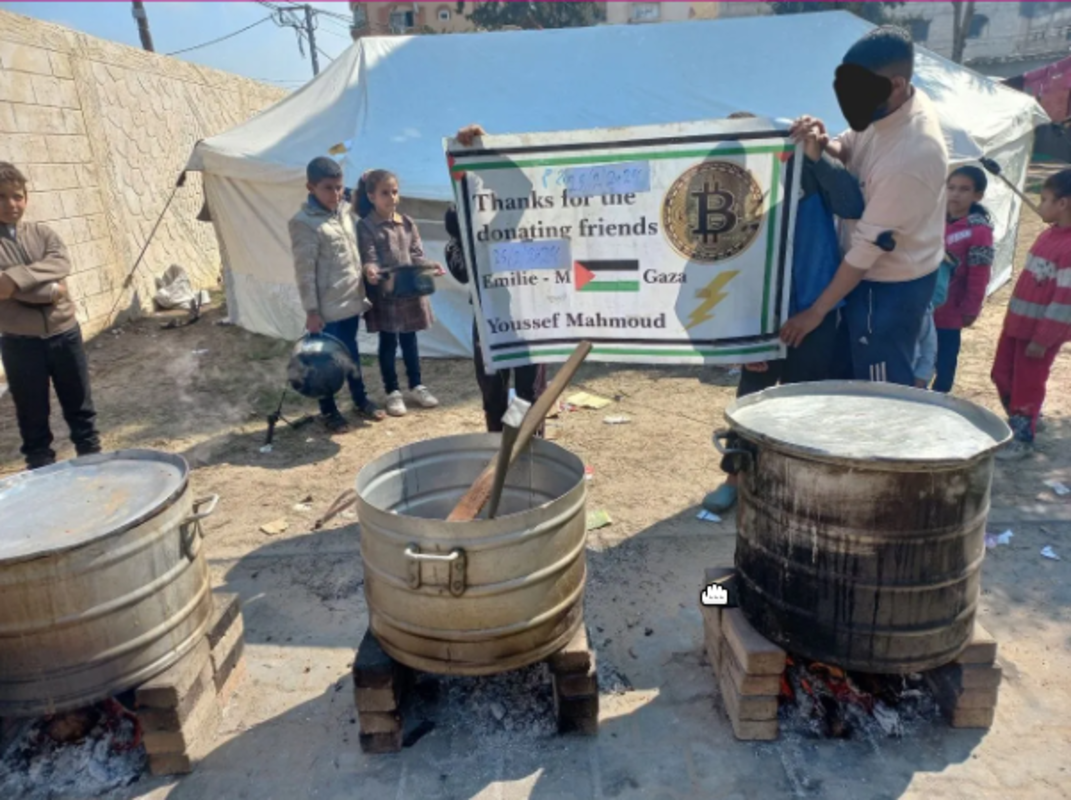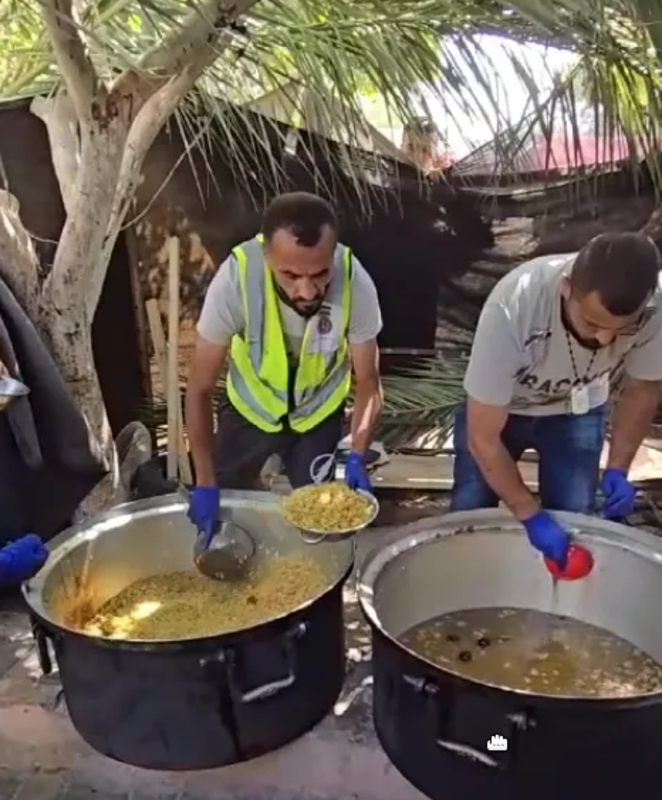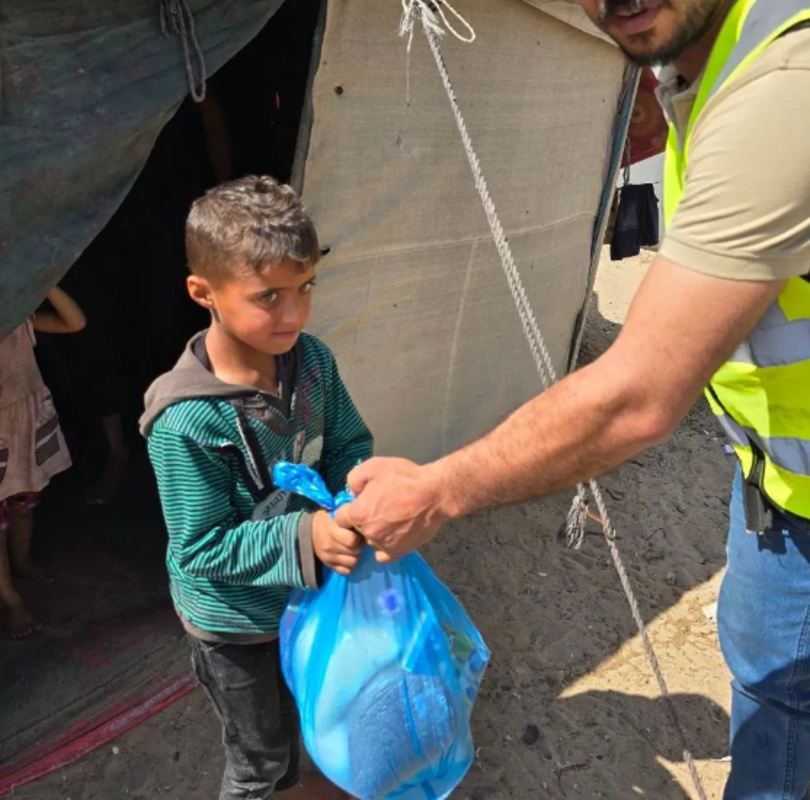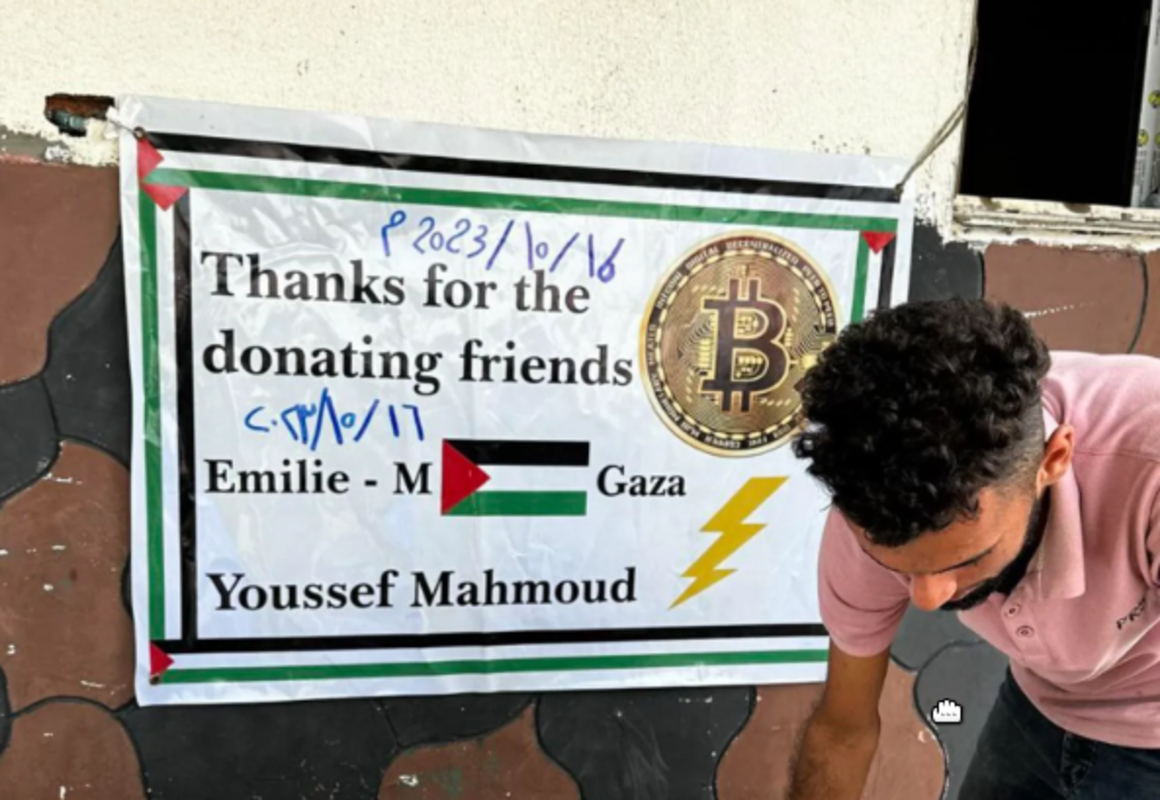Palestinian Taxi Driver Uses Bitcoin to Save Gaza Citizens

Countless lives were changed on October 7, 2023, and Yusef Mahmoud’s was no different. Even before the war, a Palestinian taxi driver could not stand to watch unemployment and hunger, both of which were prevalent in daily life in Gaza. In 2022 and early 2023, more than two million people in Gaza lacked clean water and a proper sanitation system, while two-thirds of the population lived in poverty.
Against this background, Yusef turned to the Internet for help. It was Ramadan 2023 and he was wondering if other Muslims around the world would contribute bitcoin, the first cryptocurrency, which he could use to buy and distribute food to those in need and toys to the children of Gaza. UK-based Bitcoiner Fumble was among those who answered his call.
“I quickly realized that Yusef was passing on the support he received to the people on the ground,” Fumble recalled. “As Bitcoiners sent satoshis (small units of bitcoin) to Yusef, he sent back pictures of the impact of the donations on the elderly and orphans around him. When I saw more evidence of his work, I wanted to help, and that’s when I suggested Geyser as a way for Yusef to organize his campaign and expand the project.”
In April 2023, Yusef launched a project on Geyser, a global Bitcoin crowdfunding platform, to raise additional funds and provide food and drinking water to needy Palestinians.
When the going got tough, support followed
In the months that followed, Yusef’s project took on new dimensions. The situation in Gaza was worsened by the military offensive, which displaced 85 percent of Gaza’s population and brought the economy to a standstill, exacerbating poverty and unemployment. The need for food and water increased and Yusef shifted his focus from supporting families during Ramadan to providing daily essentials to people in need.
Between April 2023 and May 2024, more than 1,500 people contributed to the creation. This enabled Yusef to buy food and drinking water for 20,000 families in Gaza, each with five to seven members. About 500 orphans are being helped.
Fumble explains that having Geyser’s project made it easier for people to support Yusef’s efforts. Today, Yusef relies on these donations to continue providing canned food, baby supplies, drinking water, bags of flour, clothing, and medical supplies. Donations have also ensured that Yusef has enough credit on his e-SIM card to stay connected and up-to-date with what the community needs, and to be able to access the donations received through the project.

“Many people here now use Bitcoin, there is no other way.”
Two months into the war, unemployment in Gaza had risen to 79.3%. Local people lack sources of income and access to water, sanitation, health care, and education. Half of the locals are children. Meanwhile, even those who were grateful to the bank found themselves unable to make money.
“During wars, you’re only left with the change you have in your wallet,” Yusef explained on a difficult phone call, where Fumble was once again there to help bridge our language gap. “Banking apps on our phones are down and banks are closing accounts in Gaza. We only have cash or Bitcoin. “
Fumble explains that the Palestinian economy runs on the Israeli shekel and that the financial system in Gaza is almost entirely dependent on Israel, which must authorize the movement of money into the area. “The reason why Israel controls what goes into their banks,” Fumble said.
Because of this, many Palestinians rely on contacts from abroad to manage or access their money, but tales abound of people trusting someone to receive their money only to find that person won’t transfer it to its rightful owner. Money transfers often charge fees of up to 30%.
For people like Yusef, Bitcoin emerged stronger than ever as an alternative. Its peer-to-peer, non-permissive nature enables it to overcome financial and platform barriers to receive aid from abroad and help the underprivileged. Additionally, fees for exchanging bitcoin to fiat currency are around 5%, making it cheaper and faster than the other way around. “You can see why so many people here are now using Bitcoin; there is no other way,” said Yusef.
Additionally, some crowdfunding platforms don’t work in Gaza or don’t list them, so you can’t use them to send or receive funds if you’re registered in Palestine. Geyser continues to make it possible for people in this area to raise money using bitcoin, with additional security measures such as requiring users to self-report to ensure that the funds are not used to support criminal victims.

“Citizens are not at fault in this war, that’s why I’m helping them.”
Further exacerbating the economic situation in Gaza, many families are being torn apart by forced evictions as Palestinian men are imprisoned on a large scale while their families are told to flee. “The fathers were the ones who supported the children in Gaza, and many families are left alone. These are the people who often come to me asking for help,” said Yusef.
To help them, Yusef drives regularly to Rafah looking for supplies. Commuting is not easy. Scattered across Gaza makes Yusef more vulnerable to being targeted while thorough military inspections prevent goods entering Rafah from Egypt. “Availability is deliberately limited,” explains Fumble. “No anesthetic, no insulin, medical respirators are punctured… Even medical scissors can be taken as a weapon and used as an excuse to refuse a lot of things. Not to mention that the trucks were deliberately delayed so the food was spoiled.” When asked what motivates him to continue, Yusef simply answers: “Civilians are not at fault in this war, that’s why I’m helping them.”
But there are good days. In March 2024, Yusef was able to buy 2,700 chickens in Egypt to feed his community. The order is qualified as a ‘commercial volume’, which facilitates border management. This large-scale transaction is a source of hope for Yusef, but it is only possible if large donations come in.
In April 2024, Yusef’s project received $48k worth of bitcoin. I ask Yusef if he is proud or surprised by this success, to which he says: “My biggest success has been getting people, especially children, the help they need.” Recently, he built nearly 100 tents to shelter displaced families.
Although his project is always among the most funded of Geyser, it is sometimes difficult to keep up with the constant demands and costs that Yusef is trying to meet. For example, not only is food hard to come by but it also comes with a huge rate of inflation if any. The week we hit, right after Yusef raised $48k from Geyser, donations were scarce and he came close to selling his car to raise money to help people in need of medical help. “In order to help more people, we need money to access large services and hire cars or trucks to transport those goods to homeless communities,” he explained.

Using bitcoin to meet people’s immediate needs, one day at a time
On the Internet, the work continues X, where Fumble helps Yusef spread the word about the project so the donations don’t stop. “Yusef sends me videos of the work being done on the ground, which helps to prove that this work is reliable and authentic. The consistency with which he shares those videos helps to be transparent about his intentions. “The challenge is to share as much information as possible without compromising people’s safety,” explains Fumble.
“You have to be very careful,” said Fumble. “We want to show everything that’s happening and Yusef’s first content is valuable for that. The more visible it is, the more likely people will donate. But at the same time, we need to protect the innocent citizens of Gaza, many of whom feel abandoned by the world.”
In keeping with that idea, the Palestinian people adhere to the long-held mantra of “strong.” When asked if he has hope that life will return to normal, Yusef does not hesitate: “Yes, of course.”
Until then, Fumble is thinking about how he can help the people of Gaza. On the cards is the possibility of manufacturing and providing 3D printed prosthetic limbs to children who lost their legs during the conflict. “When I share these ideas with Yusef, he just says ‘God willing’,” said Fumble, “because he doesn’t take anything for granted; he works hard to meet the immediate needs of the people. “Bitcoin donations have become a way for people to get through the day.”
Donate to Yusef’s Save Gaza project here.

This is a guest post by Michele Morucci. The opinions expressed are entirely their own and do not reflect those of BTC Inc or Bitcoin Magazine.




